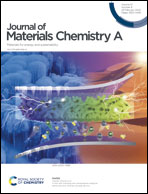A highly sensitive and ultra-stretchable zwitterionic liquid hydrogel-based sensor as anti-freezing ionic skin†
Abstract
Soft conductors show great promise in multifunctional sensor applications. However, both electronically and ionically conductive materials are often vulnerable during large deformation or at low temperatures, leading to reduced sensitivity, which is usually overlooked and remains an unaddressed challenge. In this work, we report a novel zwitterionic liquid polymer hydrogel with extraordinary mechanical versatility, high transparency and conductivity, and anti-freezing ability to overcome the above limitations. The conductive zwitterionic nanochannels formed by the zwitterionic liquid (ZIL) and methacrylate lysine (LysMA) endow the hydrogel with excellent conductivity and low-temperature tolerance. Furthermore, the hydrogel exhibited high transparency, remarkable stretchability (over 2000%), self-healing properties, high adhesiveness to diverse substrates and high conductivity, even at low temperatures (−40 °C). These attributes are advantageous for sensor applications. Owing to these outstanding properties, the hydrogel was evaluated for a skin sensor application, and the hydrogel-based sensor showed a gauge factor (GF) of up to 6.42 and 14.96 with and without LiCl, respectively. More importantly, this hydrogel exhibits high strain sensitivity over an extremely broad workable range with good stability and repeatability. In conclusion, the zwitterionic liquid-based electronic sensor with flexible, stretchable, self-healing and anti-freezing properties is a promising candidate for strain sensors and ionic skin for wearable electronic devices.



 Please wait while we load your content...
Please wait while we load your content...